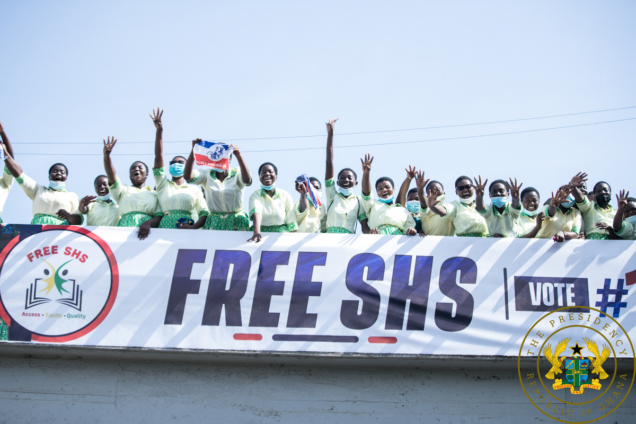Former President John Darimani Mahama and the National Democratic Congress (NDC) have stated in their 2024 manifesto that the next NDC government will review the Free secondary high school (SHS) education policy within 100 days in office.
Top on former President Mahama and the NDC’s list is to: ‘abolish the double-track system to restore a stable one-track academic calendar’.
Any attempt to abolish the double-track calendar will deny an estimated 1,800,000 students access to free senior high school and technical vocational education and training (FSHS/TVET).
The double-track schools now operate a transitional calendar, which allows schools to make maximum use of their available spaces.
A transitional calendar allows schools to operate without dividing any year group into two or double-tracking any year group: No Green or Gold Tracks.
However, to maximise the use of their infrastructure, two out of the three groups will be in school at any given time.
Under the previous trimester system, teacher-student contact hours in an academic year were 1,080 hours and 3,240 hours for the three years.
Under the double track/transitional calendar and semester system, teacher-student contact hours in an academic year are 1,134 hours and 3,402 hours for the three years.
This means under the double track/transitional calendar, students do 162 hours more than in the old system. This has been reflected in their excellent performance in the West African Senior School Certificate Examination (WASSCE) of the West African Examinations Council (WAEC), since 2020.
How double track/transitional calendar works
To better understand and appreciate the importance of a double-track/transitional calendar, let us take a school with 3,000 available spaces.
Under the old single-track/trimester system, the school can enrol a maximum of 3,000 students per academic year. That is an average of 1,000 students each for Form 1, Form 2, and Form 3.
Under the double track/transitional calendar and semester system, however, the school can enrol 4,500 students using the same 3,000 spaces; each of the three-year groups can enrol 1,500 students.
This is made possible because two out of the three groups will be in school at any given time.
As an all-year-round school calendar, the double track/transitional calendar provides these scenarios:
- Form 1 and Form 2 in school, Form 3 on vacation
- Form 2 and Form 3 in school, Form 1 on vacation
- Form 3 and Form 1 in school, Form 2 on vacation
With about 300 schools running double track/transitional calendar and semester system, a change to the old system means some 450,000 students will be denied access to FSHS/TVET each year.
Over the next 4 years, 2025 to 2028, an estimated 1,800,000 students shall be denied access to FSHS/TVET.
The implementation of the Transitional Calendar has become possible due to the massive infrastructure interventions on senior high school campuses across the country since 2017.
The government of the New Patriotic Party (NPP) through the Ghana Education Trust Fund (GETFund) and other initiatives, has completed over 4,000 projects including dormitories, classroom blocks, and many other facilities as of September 2024, on secondary and technical school campuses.
Further, to maintain quality teaching and learning, government has employed over 50,000 teaching and non-teaching staff to augment the existing SHS/TVET staff and provide teaching and learning materials to students.
With the continued increase in patronage in the FSHS/TVET, Dr Mahamudu Bawumia and the NPP say they will protect and enhance the Free Secondary Education policy, with a strong emphasis on TVET and STEM, by continuing to fully fund the policy.
Further, Dr Bawumia says he will leverage improved infrastructure to phase out the double track and harmonise the academic calendar across secondary schools.
The double track/transitional calendar is the nucleus of the free secondary education policy. Any attempt to tinker with a double track/transitional calendar without proper planning will collapse the entire free secondary education policy.
The proposal by the former President to abolish double track within 100 days in office, is a subtle way of saying NDC will cancel free secondary education.
With a target of 100 per cent transition from junior high to senior high in mind – currently, 83 per cent – there is no need for any party or individual, to be in a haste to abolish a double track/transitional calendar merely for political expediency and as such, a decision to cancel double track, will deny a whopping 1,800,000 students access to secondary education.
******
The writer is a Professor and former Director-General of Ghana Education Service. he can be reached via email at kopokuamankwa@gmail.com
Latest Stories
-
Mother of girl with kidney failure overwhelmed with gratitude as Ibrahim Mahama funds daughter’s $25k transplant
13 mins -
Public Libraries increased from 36 to 133 since 1981 – Hayford Siaw
21 mins -
‘The President is the government, everyone else is just an advisor’ – Kufuor asserts
25 mins -
Black Stars: Consistently underperforming players should not be called up – Sannie Daara
34 mins -
Empowering Ghana’s beauty industry: Bazoma Saint John opens headquarters in Ghana
52 mins -
GIZ, partners help achieve health resilience through pandemic management projects
54 mins -
Today’s front pages : Thursday, November 14,2024
1 hour -
2025 AFCON Qualifiers: Black Stars touch down in Luanda ahead of Angola clash
1 hour -
PGMOL taking new Coote allegations ‘very seriously’
2 hours -
2025 AFCON Qualifiers: Cote d’Ivoire, Equatorial Guinea book spots without playing
2 hours -
‘Bawumia is the best man Ghana needs at this moment in our history’ – Kufuor
2 hours -
Akufo-Addo’s tenure has left Cocoa communities poorer, says Joyce Bawah
2 hours -
Suspension of Foreign Exchange Licence does not affect normal banking operations – CBG
3 hours -
Over 1K SMEs assessed for technical support to export in short and medium terms – GEPA
3 hours -
Lydia Alhassan confident of retaining Ayawaso West Wuogon seat
3 hours

